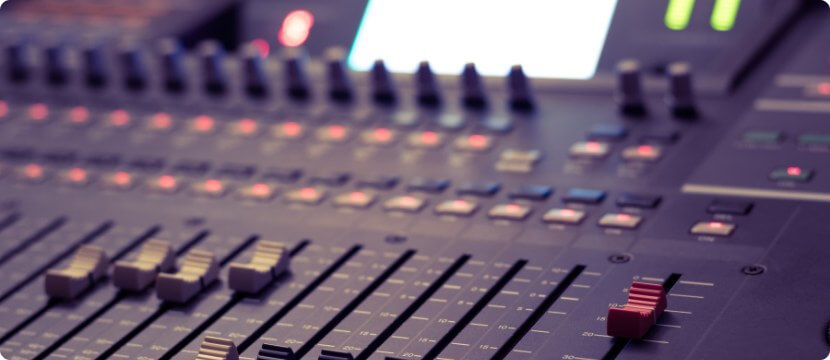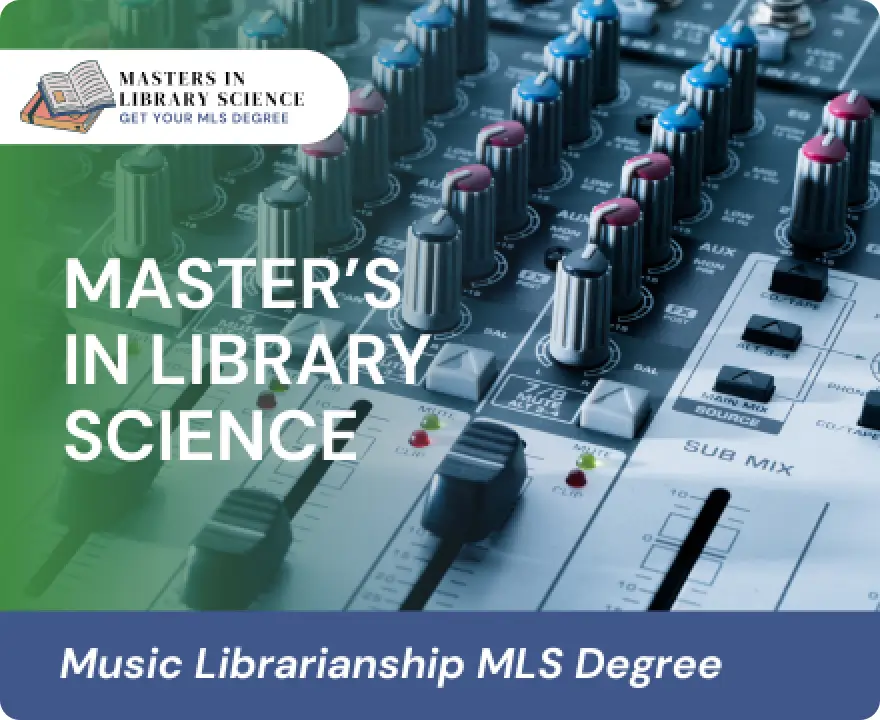Master's in Library Science in Music Librarianship Degree Online
Find the best online Music Librarianship MLS program for you
- What is a Master’s in Music Librarianship Degree?
- Admissions Requirements for a Master’s Degree in Music Librarianship
- What Classes Will I Take in a Music Librarianship Program?
- Careers in Music Librarianship
- Online Music Librarianship MLS Degree Programs
- Finding the Right Online MLS Degree for Music Librarianship
What is a Master’s in Music Librarianship Degree?
A Master’s in Music Librarianship is a specialized MLS degree that prepares students for careers managing music collections and supporting music research. Music librarians curate extensive collections that include sheet music, recordings, and scholarly resources. They assist patrons—often musicians, composers, and music scholars—in navigating these resources for study, performance, or research. Music librarianship emphasizes knowledge of music history, music theory, and cataloging practices unique to music materials, such as scores and recordings.
This degree provides an understanding of how to catalog and organize music materials, maintain accessibility to both print and digital resources, and support music researchers and performers. Music librarians also play a key role in music preservation, ensuring that rare and historical materials are properly maintained. Those with a passion for music and library science find this specialization rewarding, as it combines artistry with academic support, creating a vital link between music resources and those who need them.
A Master’s in Library Science (MLS) with a specialization in Music Librarianship combines expertise in library science with a deep understanding of music as both an art form and academic discipline. Music librarians work in a variety of settings, such as universities, conservatories, public libraries, and archives, where they curate collections, assist with music research, and manage music scores, recordings, and historical documents. This specialized degree is ideal for those who are passionate about both music and information management and want to contribute to the preservation and accessibility of music resources for students, researchers, and the public.
Admissions Requirements for a Master’s Degree in Music Librarianship
Admission requirements for an MLS degree specializing in Music Librarianship are generally similar to other MLS programs, though some programs may place additional emphasis on applicants’ music background.
- Bachelor’s degree from an accredited institution, often with a preference for backgrounds in music, music education, or related fields
- Minimum GPA requirement, generally 3.0 or above
- Statement of Purpose describing interest in music librarianship, relevant experience, and career goals
- Professional resume or CV that highlights any experience in libraries, music, or related settings
- Letters of recommendation (usually 2-3) from academic or professional sources who can attest to the candidate’s skills and commitment to music librarianship
- Music Proficiency: Some programs may require evidence of music theory knowledge or proficiency with musical instruments or voice
- GRE scores (some programs may waive this requirement)
- English proficiency test scores (e.g., TOEFL or IELTS) for international students
Experience in music performance, music history, or library work is often advantageous. Programs look for applicants who demonstrate both a commitment to librarianship and an understanding of music, as this knowledge is essential to successfully navigate the field of music librarianship.
What Classes Will I Take in a Music Librarianship Program?
An MLS program in Music Librarianship combines foundational library science courses with specialized classes on music cataloging, collection development, and music history. Students develop the skills needed to work with music materials, understand music resources, and support music research and performance. Most programs require 30-45 credit hours and may include opportunities for practical experience in a music library or archive
- Foundations of Library and Information Science
- Music Cataloging and Classification: Covers cataloging techniques specific to music materials, including scores, recordings, and digital files.
- Music Reference and Research: Teaches strategies for assisting patrons with music research, including using specialized music databases and resources.
- History of Music and Music Literature: Provides an overview of music history, genres, and notable works, enhancing librarians’ ability to curate and organize collections.
- Digital Music Libraries: Focuses on managing and providing access to digital music resources, including streaming services, online archives, and databases.
- Collection Development for Music Libraries: Explores how to build and maintain a collection of music resources that supports the needs of the institution’s patrons.
- Music Preservation and Conservation: Teaches students about preservation techniques for sheet music, recordings, and other music materials, ensuring long-term accessibility.
- Information Literacy and Research Skills for Musicians: Provides techniques for teaching musicians and researchers how to effectively use library resources for study and performance.
- Practicum or Internship in Music Librarianship: Offers hands-on experience in a music library, conservatory, or archive, allowing students to apply their skills in a real-world setting.
These courses prepare students for the specialized tasks involved in managing music collections, helping them understand both the technical aspects of librarianship and the unique requirements of music-related resources.
Online Music Librarianship MLS Degree Programs
An online MLS degree with a specialization in Music Librarianship provides a flexible option for students who need to balance other commitments. Online programs offer the same rigorous coursework as in-person programs, with classes on music cataloging, digital music libraries, and preservation. These programs use interactive features, such as virtual lectures, discussion forums, and access to digital music resources, to ensure that students receive a comprehensive education.
Some online programs offer local internship or practicum options, allowing students to gain hands-on experience in music libraries, archives, or conservatories near their location. These practical experiences are invaluable, as they provide students with real-world skills in managing music collections and supporting music research. Graduates of online programs are often well-prepared for roles in music librarianship, equipped with the digital literacy and cataloging skills needed to succeed in this evolving field.
Finding the Right Online MLS Degree for Music Librarianship
When selecting an online MLS program in Music Librarianship, it’s essential to consider factors such as tuition, program length, and hands-on learning opportunities. Tuition for these programs can vary widely, from approximately $12,000 to $40,000, with financial aid, scholarships, and assistantships often available. Full-time programs usually take 1-2 years to complete, while part-time options provide flexibility for those who may be working or have other commitments.
It’s also beneficial to look into each program’s internship and career support options, as these can significantly impact job placement after graduation. Programs that offer strong connections with music libraries, conservatories, or orchestras may provide better networking opportunities and practical experience. By carefully researching these aspects, students can find the program that best aligns with their career goals, preparing them for successful careers in music librarianship where they support music resources, research, and performance.
How Long Does It Take to Complete a Library Science MLS Program in Music Librarianship?
A Master’s in Library Science with a specialization in Music Librarianship typically requires 2-2.5 years of full-time study, with part-time programs extending the timeline to 3-4 years. Students complete around 36-42 credit hours, focusing on library science fundamentals alongside specialized courses in music cataloging, musicology, and performing arts resource management. Some programs offer accelerated tracks for students with prior experience in music or library work, allowing them to complete the degree in as little as 18 months. Dual-degree options, such as combining an MLS with a Master’s in Musicology, are also available and may take up to 3 years to complete.
Internship Requirements for Completing a MLS in Music Librarianship
Internships are a crucial part of the Music Librarianship specialization, giving students real-world experience in managing music resources and supporting performers and researchers. Students are typically required to complete 120-200 hours of internship work in academic music libraries, orchestral archives, or performing arts organizations. Common tasks include organizing sheet music and scores, managing sound recordings, assisting with music cataloging, or supporting research in music history or performance practices. Some students may intern with renowned organizations such as the New York Philharmonic Archives, the Library of Congress Performing Arts Division, or university music libraries, where they gain invaluable experience working with specialized collections. These internships help students develop a strong understanding of music resource management and build connections within the field of performing arts librarianship.
Careers in Music Librarianship
Graduates with an MLS in Music Librarianship have various career options in libraries, archives, academic institutions, and music conservatories. Music librarians work closely with musicians, composers, scholars, and the public, providing access to valuable resources and supporting music research. Here are some common career paths for music librarians, along with average salary data and examples of organizations that hire for these roles.
- Music Librarian: Music librarians manage music collections, provide research assistance, and help patrons locate music resources. They work with sheet music, recordings, and digital music collections, often in academic or conservatory settings.
- Average Salary for a Music Librarian: $55,000 – $75,000 annually
- Organizations Hiring Music Librarians: University libraries, music conservatories, public libraries with music collections
- Sound Archivist: Sound archivists specialize in managing audio recordings, including music, interviews, and historical sound recordings. They ensure that audio materials are cataloged, preserved, and accessible for research and study.
- Average Salary for a Sound Archivist: $50,000 – $70,000 annually
- Organizations Hiring Sound Archivists: Libraries with sound archives, historical societies, music libraries, government agencies
- Digital Music Librarian: Digital music librarians focus on managing digital collections of music, such as streaming audio, digital scores, and online music databases. This role is essential in modern music libraries where digital access is a priority.
- Average Salary for a Digital Music Librarian: $55,000 – $80,000 annually
- Organizations Hiring Digital Music Librarians: Academic libraries, digital archives, online music platforms, research institutions
- Music Cataloger: Music catalogers specialize in the organization and classification of music materials, including scores, recordings, and multimedia. They ensure that music resources are accessible and organized according to library standards.
- Average Salary for a Music Cataloger: $50,000 – $65,000 annually
- Organizations Hiring Music Catalogers: Music libraries, academic libraries, conservatories, public libraries
- Music Collections Curator: Music collections curators oversee collections that include rare music manuscripts, recordings, and historical instruments. They may curate exhibits and work to preserve valuable or rare music items for research and public engagement.
- Average Salary for a Music Collections Curator: $60,000 – $85,000 annually
- Organizations Hiring Music Collections Curators: Museums, music archives, university libraries with music collections
- Performance Librarian: Performance librarians work with orchestras, ensembles, and other music performance groups, managing sheet music, preparing scores for performance, and organizing music libraries for performers.
- Average Salary for a Performance Librarian: $55,000 – $70,000 annually
- Organizations Hiring Performance Librarians: Orchestras, symphonies, conservatories, opera companies
Careers in music librarianship allow individuals to combine their passion for music with the organizational and research skills of librarianship. Librarians in specialized fields like music librarianship can expect steady demand, especially in academic institutions and cultural organizations that support music study and performance.


Online MLS/MLIS Degrees
- Best Online MLS/MLIS Degree
- Archival Studies Degree Online
- Academic Librarianship Degree
- Children & Youth Services Degree
- Cultural Heritage Preservation Degree
- Digital Libraries Degree
- Law Librarianship
- Public Librarianship Degree
- School Librarianship Degree
- Book Arts Degree
- Music Librarianship Degree
- Records Management
